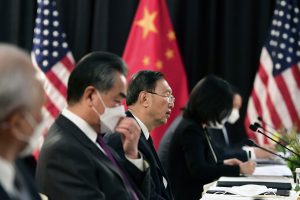Joseph R. Biden has now been U.S. president for more than two months. His policies appear to be aimed above all at domestic stability, including the recovery of the domestic economy. The administration appears to take the position that achieving a domestic economic recovery together with social stability will give it more options for foreign policy. This is reflected in the Interim National Security Strategic Guidance of March 3. In terms of foreign policy, relatively high priority has been given to rebuilding relations with primarily Western Europe and NATO, while its China policy is as yet largely unknown. As for global challenges, issues such as climate change are prioritized, while the administration’s overall vision on other issues is still unclear.
In this context, the Pentagon has launched the China Task Force to discuss China policy. From now until the summer, this Task Force will gather information and develop policy. Meanwhile, a delegation led by Secretary of State Antony J. Blinken and Secretary of Defense Lloyd J. Austin III visited Japan and South Korea to gather information and exchange views. These developments are geared toward coming up with a China policy.
The Biden administration’s policy on China will most likely look to address each issue separately. For example, it will take a tough stance on cutting-edge dual-use technologies, but cooperate in space development. It will confront China on the Free and Open Indo-Pacific (FOIP) strategy, but cooperate with China on the North Korea issue. However, this “compartmentalized” approach gives rise to a number of concerns.
First, these individual issues are intertwined and as such are not easy to separate. Cutting-edge industries that can be used for civilian purposes as well as having military applications relate to both the military and economic spheres, but they are also related to climate change and the space domain. While some argue that the U.S. and China must cooperate on climate change, the close association between climate change issues and advanced industries means that any cooperation will be quite limited in nature. Alternatively, it means that the U.S. and China may not cooperate on climate change but may engage on climate change issues with the wider international community on an individual basis.
Second, while each individual issue is interrelated, cooperation established on one issue may not be established in respect of others. In this case, it is important to set principles and goals to clarify the priority area of cooperation. Whether or not the U.S. and China are able to adopt such principles is of course a question.
Third, there is the question of whether China will be content with this “compartmentalized” approach. From China’s point of view, it will cooperate with the United States in areas where the United States requires cooperation from China, but in exchange for that cooperation will demand concessions from Washington on points of conflict. Can an issue-by-issue merit-based policy be successful when dealing with China?
Fourth, how can a policy based on this type of issue-by-issue approach as a whole be communicated to China? The Obama administration adopted a cost imposition strategy. However, it is questionable whether the cost perspective was adequately communicated. What message will be communicated to China if an issue-by-issue merit-based approach is adopted?
With these concerns in mind, what might we expect if a strategy of dealing with each issue separately were actually adopted? One possibility would be that if an issue-by-issue merit-based approach is adopted when cooperation is called for, it will be exceedingly difficult to coordinate each instance individually. This may make it difficult to coordinate with China. It also raises the question of who will coordinate the decision on whether to prioritize high-tech issues for both the military and civilian sectors, or to seek cooperation with China in space and climate change, and on how they will do it. Consequently, actual gains in individual sectors are likely to be limited unless principles and criteria that clarify priorities are established.
To effectively form its China policy, even if an issue-by-issue merit-based approach is adopted, it will not work well without a system that facilitates coordination on an issue-by-issue basis and clear principles that allow priorities to be set.

































